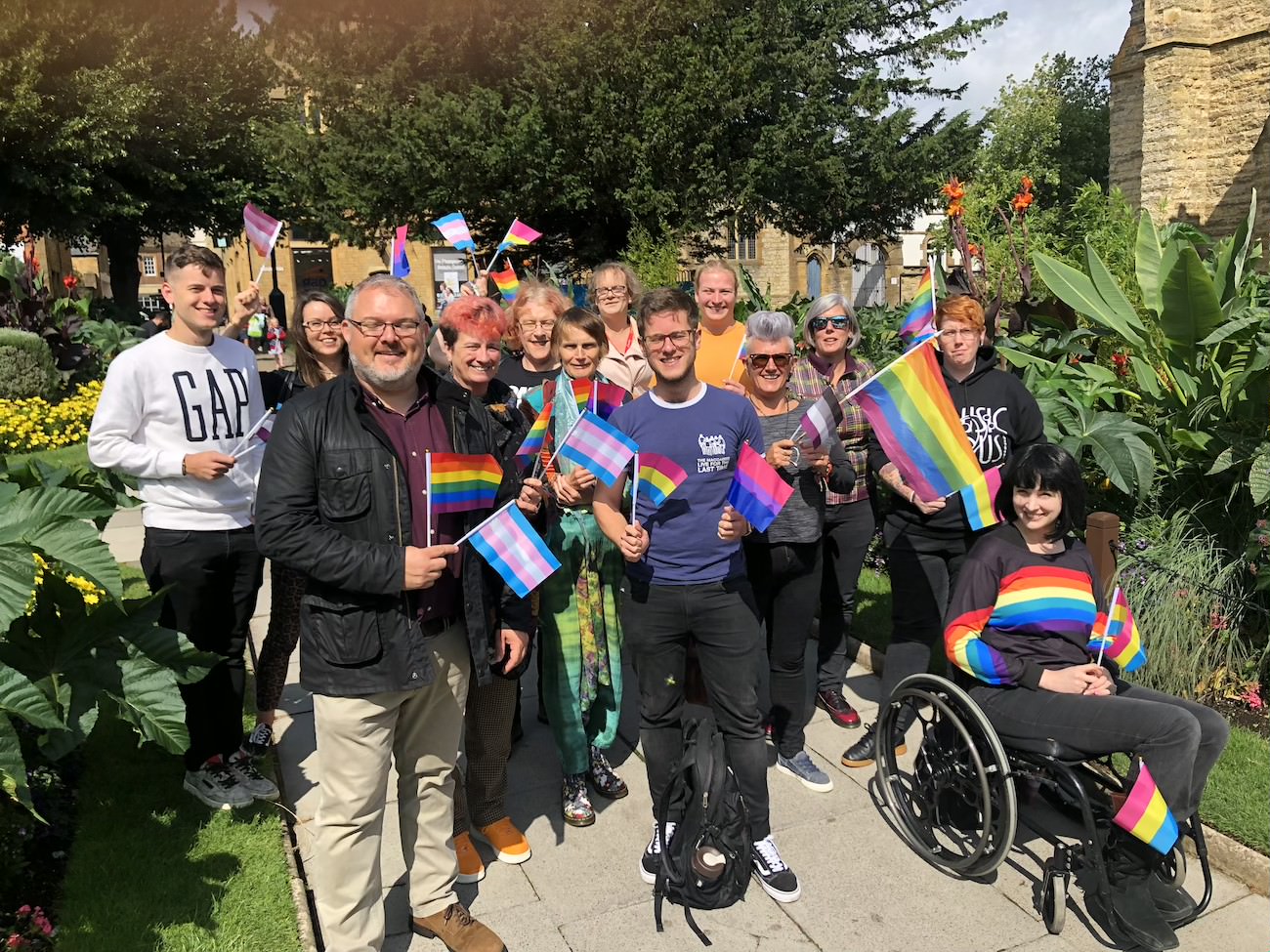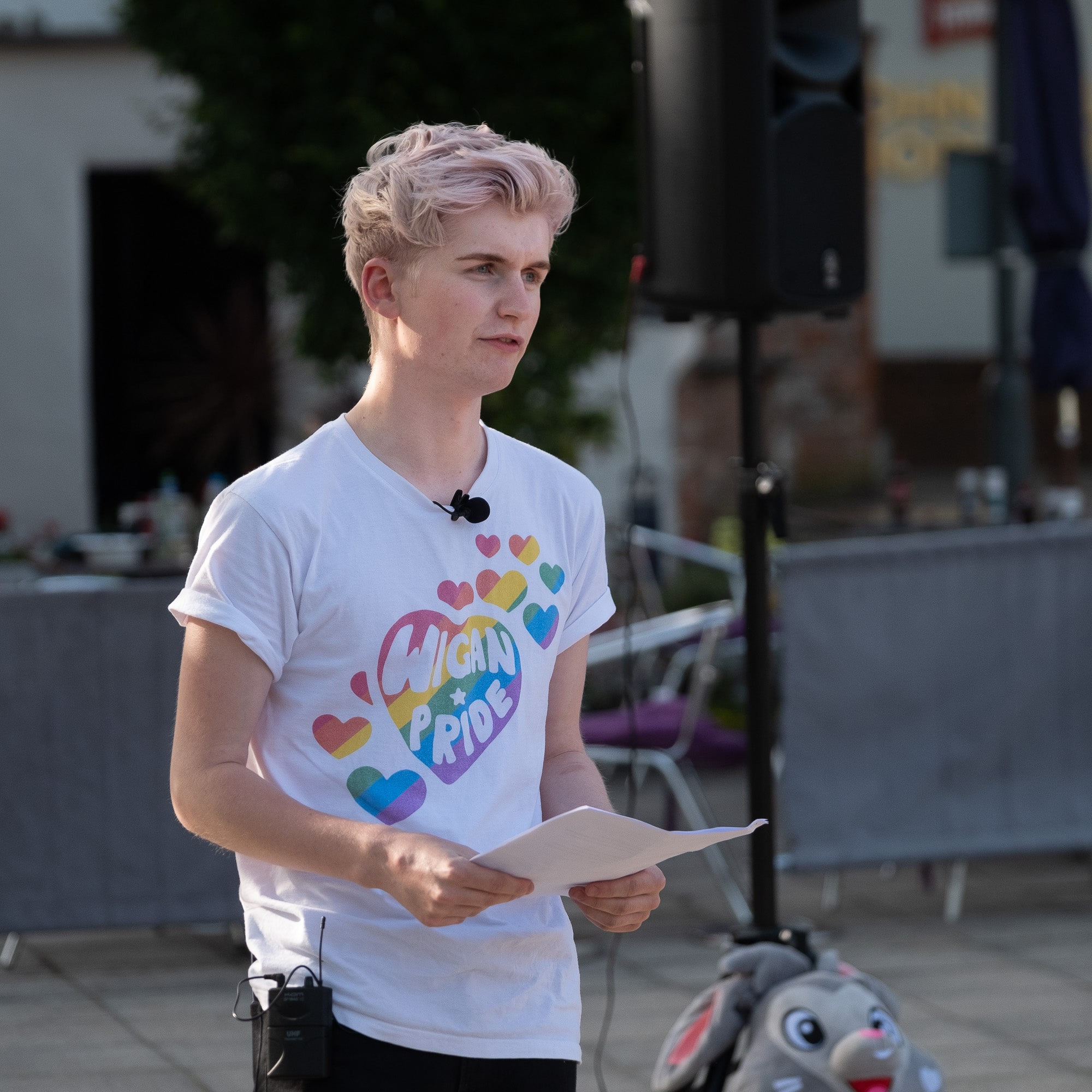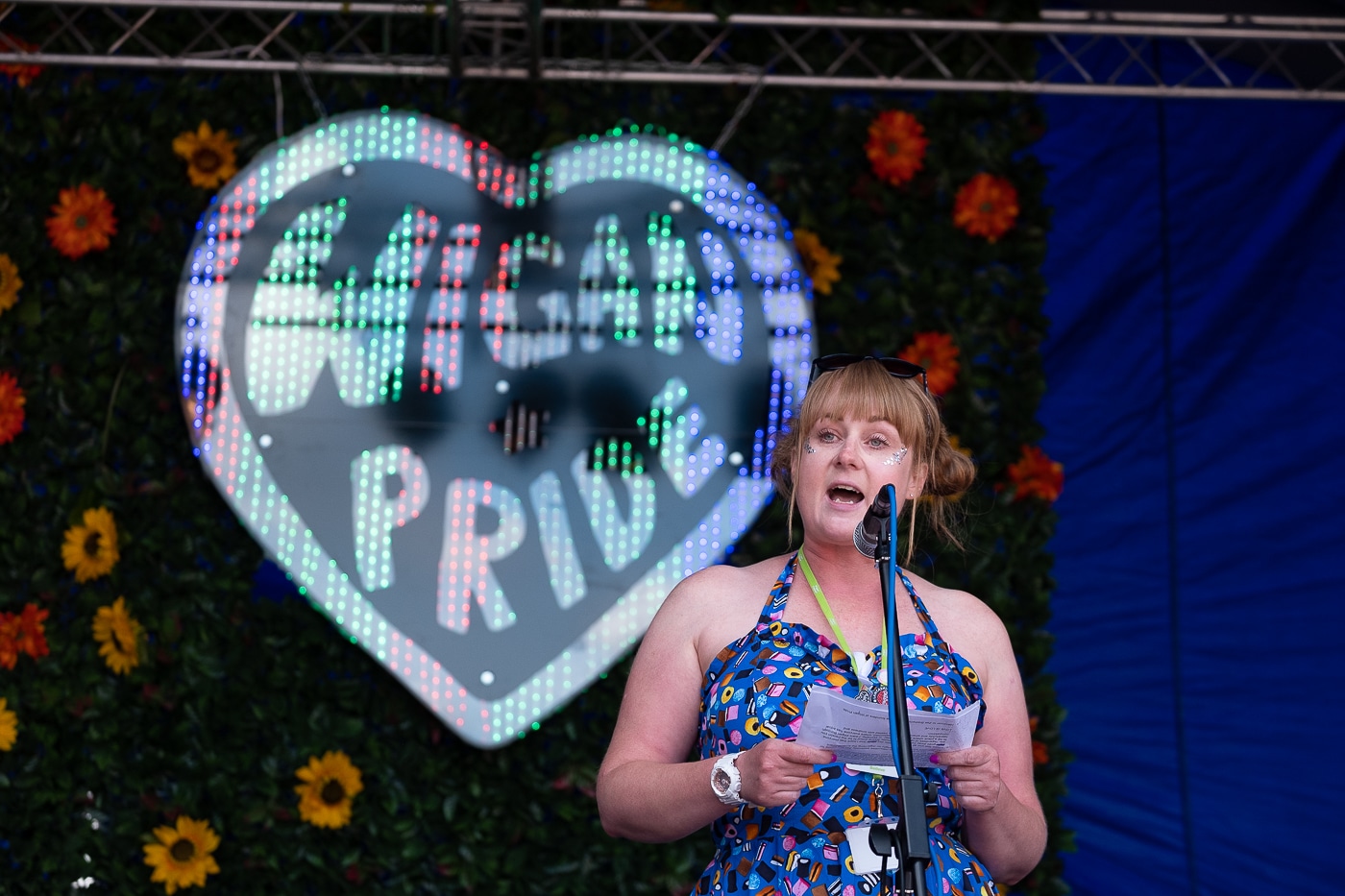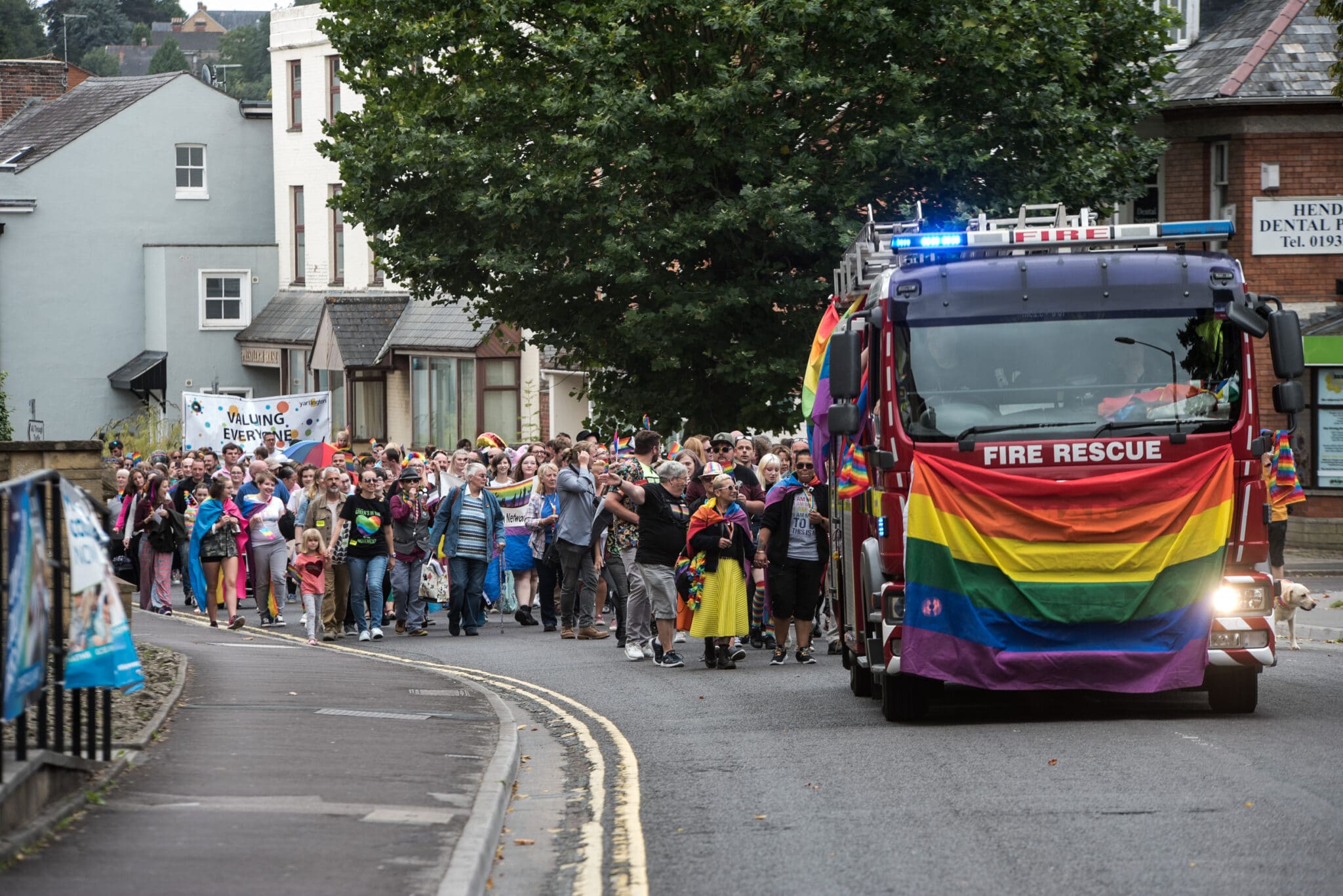An image of the first Yeovil Pride in 2019. (Len Copeland/Provided)
LGBT+ Pride isn’t just for city folk. Pride is for all, as grassroots organisers from towns and islands told PinkNews.
In the summer of 2019, around 200 people marched through Yeovil, South Somerset in the town’s first ever Pride march.
Given the months of preparation that go into the big Pride festivals, it’s remarkable that Yeovil’s first march was organised just three weeks beforehand. Local man JK Doran put out a call for people who were interested in taking part to gather in the town library, and he was heartened to see a number of locals show up to help out.
“I wanted to create something that showed local LGBT+ people that Yeovil is a place where they can be open, out and honest, after my own experience of growing up in the town where I could see no visible LGBT+ community,” Doran tells PinkNews.
Doran’s experience echoes that of the many LGBT+ people who live in towns and villages across the country. Too often, rural areas are condemned as being hotbeds of homophobia and transphobia, or are mocked by city-dwelling queer people as a “worst nightmare” scenario. Needless to say, LGBT+ life in rural areas is nowhere near as simplistic as that – in fact, queer people are everywhere and, just like in cities, many want to celebrate their existence and protest against the forces that oppress them when Pride Month rolls around in June.
The Pride movement may have begun in cities, but today, it is far more expansive than that. In recent years, Pride festivals and marches have taken place in numerous towns and villages across the UK, proving once and for all that queerness is not the preserve of city life.
The spirit of protest is alive and well in many of these festivals. Doran wants to strike a celebratory, optimistic tone for this year’s event – which is due to go ahead on 21 August – while also acknowledging the problems plaguing the local LGBT+ community.

“This year, we want to give local LGBT+ people the opportunity to come back together after a difficult time where many have been forced back into the closet,” Doran explains. “At the same time, we want to continue to protest at the treatment of our community. Recently, the South West’s only Gender Identity Clinic had wait times of over five years (where the NHS target is 18 weeks), and we had a homophobic attack in the town just last month which left a 20-something beaten unconscious. So whilst we come back and celebrate, we must also shout as one for our community.”
Doran thinks it’s “vital” that LGBT+ people have the chance to come together and push for equality – regardless of where they live.
“In 2019, when 200 people showed up to march, it was such an honour. Afterwards, I spoke to a young trans guy and an older lesbian, both of whom had come to their first Pride ever. It was very emotional, and solidifies the importance of being visibly and openly LGBT+. It’s reassuring, it’s brave and it helps countless people to know that, wherever they are on their journey, we’re here.”
Ian McKellen inspired young LGBT+ activists to launch Pride in Wigan
Elsewhere, Wigan Pride is set to go ahead in the Greater Manchester area on 14 August. Now in its sixth year, the event had an unusual genesis that was brought about with a little help from Ian McKellen. The legendary actor visited the town in 2015 and asked young people from the local LGBT+ youth group why they didn’t have a Pride festival.
“The young people had been discussing how despite the borough being centrally located between two of the region’s biggest Prides, in Manchester and Liverpool, they rarely attended either, citing both cost and travel as the barriers,” says Wigan Pride organiser Dan Bonney.
“The actor we all admired had sparked an idea and one year later we launched the first Wigan Pride.”

The event is a thoroughly grassroots offering, with organisers doing everything in their power to support local, up-and-coming artists. They have an acoustic stage for new acts where they enable people to perform for the first time in public, while they also have a main stage where professionals perform for local queer people.
Councillor Paula Wakefield, lead member for equality with Wigan Council, has also been involved in organising the festival. For her, the significance of having a Pride event in Wigan can’t be overstated.
“Growing up in Wigan borough I wasn’t really surrounded by diversity but travelling into bigger cities like Manchester really opened my eyes,” she says. “It was fantastic to see so many people from all different types of background and walks of life just able to be themselves. It was great to see but why didn’t we see it in smaller towns? Diversity isn’t just in cities, it’s all around us. That’s why having our own local Pride is so important.”
Having a local Pride festival sends “a strong message” to residents of Wigan that diversity doesn’t just exist in the town – it’s actively celebrated. It also sends an important signal that prejudice “will not be tolerated,” Wakefield says.
“We want the borough to be a welcoming place for everyone. If you want to be who you want to be then you no longer need to leave the borough and travel to big cities to find your community. They’re right here, on your doorstep.”

Over on the Isle of Wight, Pride festivities are taking a slightly different form. The island has a Pride festival, but it’s not going ahead as planned this year due to the coronavirus pandemic. Instead, members of the local LGBT+ community have put together an exhibition with local charity StoneCrabs that celebrates the island’s queer history and heritage. The exhibition aims to “bring to life a side of the island that – up until now – has been hidden from the nation’s memory”. The exhibition is open now and runs until 17 July.
“I was provoked to start a project like this because of stories that I’d heard about a thriving LGBT+ community on the island in the ’90s and late ’80s,” says Caroline Diamond. “If you watched It’s a Sin, the Isle of Wight was portrayed as quite a homophobic backwater, which in some respects it is, but it didn’t quite tell the full story.
“The full story is that there was a significant amount of money allocated to the Isle of Wight for what they called the AIDS budget in the late ’80s and that money was used to stop the spread of HIV, but there was also a thriving community here of people who were meeting up.”
LGBT+ people living on the Isle of Wight were inspired to launch their own Pride festival following two troubling incidents. First, a journalist wrote a scathing article in a local newspaper telling LGBT+ people to stop ramming Pride down people’s throats.
“People were furious, and there was a huge backlash against the article,” Diamond says. “And it kind of galvanised people – not just LGBT+ people, but also allies and family members, and they really got behind Pride.”
Locals were also emboldened when their local Conservative MP Andrew Turner went to a school and told children that homosexuality is “dangerous to society”. He later stepped down over the controversy. Those incidents made queer people on the Isle of Wight more determined than ever to show that they exist and that they’re not afraid to stand up for themselves.
“Our Pride is important because LGBTQ people are everywhere, not just in cities,” Diamond says. “We found that on the Isle of Wight, unfortunately, people have felt that they can’t be their authentic selves and live here. We had some people who couldn’t cope with life in a small, close-knit community and moved to Brighton and Southampton and places to be with like-minded people. But we don’t want to live in a country where it’s OK to be LGBT+ if you live in Brighton, London or Sheffield, but if you go to rural communities there’s still an othering in place.
“It’s about trying to make people feel that they can live here and be who they want to be, and live a life of peace, really. We want them to have the same happiness and fulfilment our straight counterparts have always enjoyed.”
